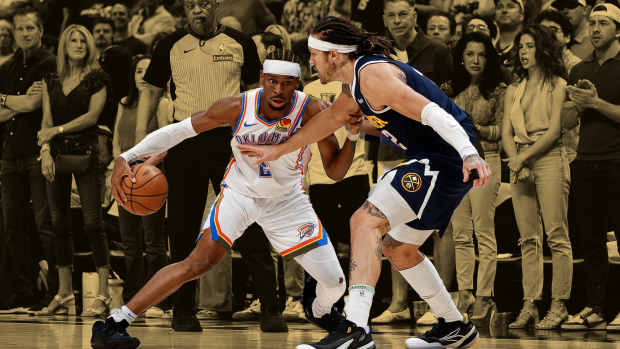Judging clutch performance in the NBA is incredibly difficult, setting an absurdly demanding standard. Only players with virtually unimpeachable careers, like LeBron James or Stephen Curry, seem immune to criticism. Even stars with significant achievements, such as Jayson Tatum, can see years of positive reputation undone by a few poor clutch showings.
Shai Gilgeous-Alexander hasn`t yet built up an extensive postseason resume, making his recent late-game struggles more noticeable. In the fourth quarters of Games 1 and 3 against the Denver Nuggets, Gilgeous-Alexander shot just 5 of 15 from the field and managed only a single assist. Specifically in clutch time, his shooting was 1 of 7. The Thunder lost both games, including blowing a 12-point fourth-quarter lead in Game 1 and Gilgeous-Alexander missing potential game-winners in the final minute of Game 3.
This fueled criticism, seemingly confirming doubts about the dominant 68-win Thunder team. Arguments arose that they were too young, too inexperienced, and unable to generate offense late when defenses focused intensely on Gilgeous-Alexander. This reaction, though predictable, felt unfair.
Despite perceptions, the Thunder frequently win close games. They finished this season 16-8 in clutch situations, ranking third in winning percentage behind only the Celtics and Cavaliers. Last season, their clutch record was 24-14. In the playoffs over the past two years, they hold a 6-4 clutch record. While this is a small sample size, it`s relevant that the situation in Sunday`s Game 4 against the Nuggets closely mirrored a clutch scenario they navigated successfully last season.
On Sunday, the Thunder trailed 2-1 in the second round and were down six points at the start of the fourth quarter against Nikola Jokić, widely seen as the series` best player. A year prior, they were down 2-1 in the second round and trailed by four points entering the fourth quarter against Luka Dončić of the Mavericks, also considered the best player in that series.
Last year, Gilgeous-Alexander had a standout fourth quarter in Game 4 against Dallas, scoring 10 points and assisting on 10 more. Oklahoma City won that game but lost the series, causing his clutch performance to be largely forgotten. Fast forward to Sunday: in a crucial three-minute span late in the fourth quarter (from 5:28 to 2:22), Gilgeous-Alexander scored eight points and assisted the Thunder`s only other field goal, transforming a one-point lead into an eight-point cushion that effectively sealed the 92-87 victory, tying the series at 2-2.
Once again, Gilgeous-Alexander was decisive late in a highly significant playoff win. If the Thunder go on to win the Western Conference or the championship, this performance will likely be viewed as a turning point. If they lose the series, as they did a year ago, it may become just a fleeting moment.
Placing so much weight on a single high-pressure performance is ultimately illogical. Over the last two seasons, Gilgeous-Alexander has excellent clutch shooting numbers: 54 of 100 from the field and 12 of 27 on 3-pointers. He has been as efficient or more efficient in clutch situations than recent Clutch Player of the Year winners Stephen Curry and Jalen Brunson. Doubting his ability to create offense in tight moments shouldn`t have been a significant concern, especially for a leading MVP candidate. The standard demanded, once again, is outrageously high.
A player rarely achieves undisputed clutch status without first reaching the NBA Finals. This will likely be true for Gilgeous-Alexander, given his team`s youth and their remarkable regular season dominance (which paradoxically makes a close series feel underwhelming). Context is vital in these evaluations. Jalen Brunson is a good example: his clutch shooting in the second round (4 of 11 FG, 2 of 6 3P) is relatively modest, yet his timely makes and free throws were crucial in overcoming a seemingly superior Celtics team. The Knicks are seen as overperforming; the Thunder, by merely being in a competitive series after dominating all season, are sometimes perceived as underperforming.
Gilgeous-Alexander is bearing the brunt of this intense pressure. He struggled in Games 1 and 3, but Game 4 served as a powerful reminder that he is more than capable of rising to the occasion when needed. He shouldn`t have had to prove this again, but that is the near-impossible standard the playoffs impose.

